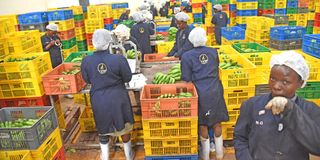
Workers sort bananas at Twiga Foods in Syokimau, Nairobi on May 30, 2019. The firm deals with smallholder farmers.
What you need to know:
- In Africa, hunger is on the rise in almost all African sub-regions. The latest data shows that 239 million hungry people are living in sub-Saharan Africa.
- The outbreak of the Covid-19 pandemic has further threatened livelihoods in the sub-region, which, apart from contributing more than half of the sub-Saharan Africa’s chronic food insecure population, also has nearly 28 million people in acute food shortage.
- SMEs add value to raw agricultural material through product transformation and can improve food security in different ways.
- Food
processing facilities have also been the site of large clusters of
Covid-19 cases and subsequent food supply chain disruptions.
Nearly 620 million people were still hungry globally in 2019, according to the recent State of Food Security and Nutrition in the World Report, underscoring the immense challenge of achieving the zero hunger target by 2030.
In Africa, hunger is on the rise in almost all African sub-regions. The latest data shows that 239 million hungry people are living in sub-Saharan Africa.
The Eastern Africa sub-region contributes more than 50 per cent of the chronically hungry people in Africa even though it accounts for under 25 per cent of Africa’s population.
Compounded impacts of droughts, severe flooding, and desert locust infestation in Eastern Africa already undermined food security and nutrition.
The outbreak of the Covid-19 pandemic has further threatened livelihoods in the sub-region, which, apart from contributing more than half of the sub-Saharan Africa’s chronic food insecure population, also has nearly 28 million people in acute food shortage.
This situation calls for immediate policy and programmatic responses through recovery and resilience building, to keep food supply chains alive and mitigate Covid-19 impacts across the already fragile food system.
Product transformation
Robust small and medium enterprises (SMEs) in the agro-food sector are vital in economic recovery and resilience because they provide income and employment opportunities to millions of people in Eastern Africa.
SMEs add value to raw agricultural material through product transformation and can improve food security in different ways.
They can reduce post-harvest losses by extending the shelf-life of food, making it easier to reach urban areas where most of the population resides. They also increase incomes and create employment along the food chain from production to consumption.
Agro-processing also improves the safety of foods through establishing appropriate certification and traceability and increasing access to markets.
These enterprises handle 80 per cent of Africa’s food consumption and 96 per cent of domestic supply chains crucial to farmers.
However, these enterprises mainly operate in the informal sector that has seen them disproportionately affected by Covid-19 and related containment measures.
Agro-food SMEs have been among the first respondents in the Covid-19 crisis. The pandemic is limiting agro-enterprises from ensuring the consistent supply of foods to markets due to enforced closures, labour shortages resulting from illness, and slowdowns in operations caused by physical distancing and lockdowns.
Food processing facilities have also been the site of large clusters of Covid-19 cases and subsequent food supply chain disruptions.
Achieving food security
Despite their significant contributions, small and medium agro-enterprises (SMAEs) face various challenges. Agro-industrial value added is still small in Africa.
SMAEs, like small farmers, have difficulty accessing finance, services, and modern inputs to build viable enterprises, constraining their potential role in local food systems.
Regulation and policy measures focus mainly on the agricultural sector, trade or broader industrial development, failing to address SMAEs’ specific needs.
Moving forward, Covid-19 control strategies must enhance workplace safety measures, such as excluding sick workers, erecting physical barriers, requiring face protection, and enhancing sanitation to prevent virus transmission.
Providing training and applying these principles in all food processing environments will reduce the transmission and limit the spread of other pathogens, thereby keeping workers healthy and the food supply safe.
In conclusion, supporting SMAEs is crucial towards achieving food security and sustainable agricultural development in Eastern Africa.




No comments :
Post a Comment